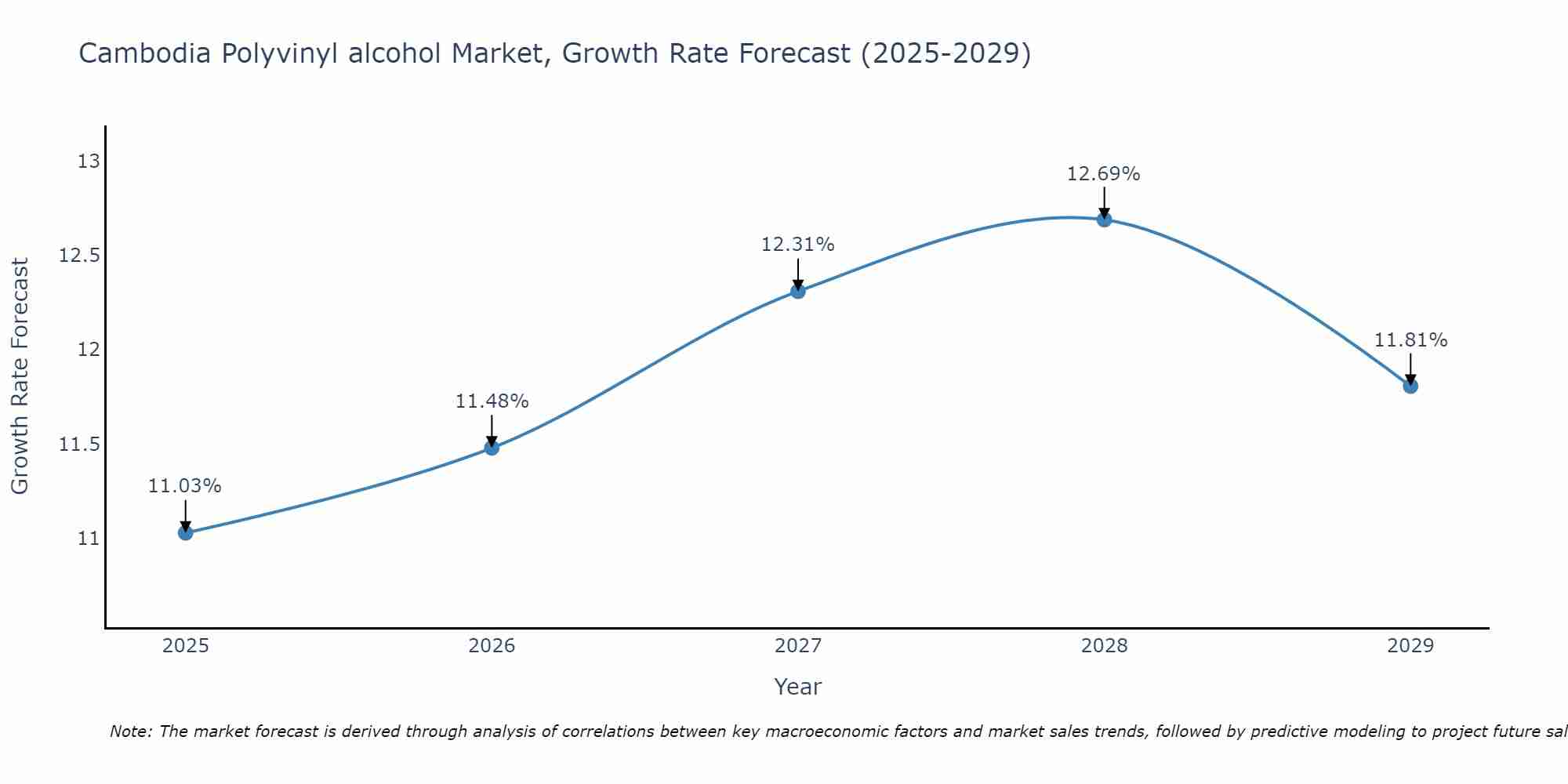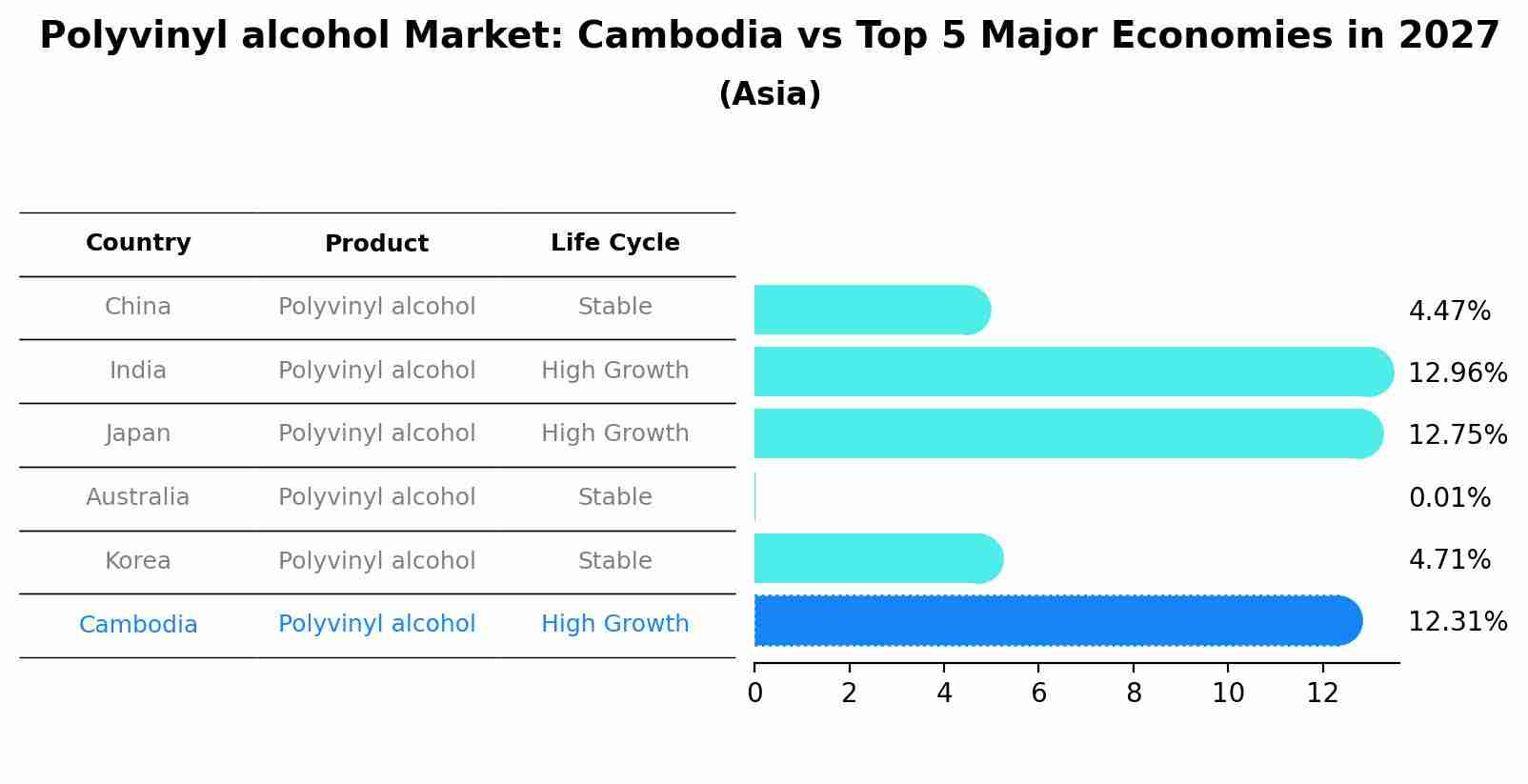Cambodia Polyvinyl alcohol Market (2025-2031) Outlook | Trends, Industry, Forecast, Companies, Value, Size, Growth, Share, Revenue & Analysis
| Product Code: ETC092092 | Publication Date: Jun 2021 | Updated Date: Jun 2025 | Product Type: Report | |
| Publisher: 6Wresearch | Author: Ravi Bhandari | No. of Pages: 70 | No. of Figures: 35 | No. of Tables: 5 |
Cambodia Polyvinyl alcohol Market Size Growth Rate
The Cambodia Polyvinyl alcohol Market is projected to witness mixed growth rate patterns during 2025 to 2029. Growth accelerates to 12.69% in 2028, following an initial rate of 11.03%, before easing to 11.81% at the end of the period.

Polyvinyl alcohol Market: Cambodia vs Top 5 Major Economies in 2027 (Asia)
In the Asia region, the Polyvinyl alcohol market in Cambodia is projected to expand at a high growth rate of 12.31% by 2027. The largest economy is China, followed by India, Japan, Australia and South Korea.

Cambodia Polyvinyl alcohol Market Overview
The Cambodia Polyvinyl alcohol (PVA) market is experiencing steady growth driven by increasing demand from various industries such as textiles, construction, and packaging. PVA is widely used in the textile industry for sizing, finishing, and printing due to its excellent film-forming and adhesive properties. In the construction sector, PVA is utilized as a cement additive to improve the strength and durability of concrete. Additionally, the packaging industry relies on PVA for its excellent barrier properties and biodegradability. The market is also benefiting from the rising awareness of environmentally friendly products, as PVA is non-toxic and water-soluble. Key players in the Cambodia PVA market include both domestic manufacturers and international suppliers looking to capitalize on the growing demand for high-quality PVA products in the country.
Cambodia Polyvinyl alcohol Market Trends
The Cambodia Polyvinyl alcohol (PVA) market is experiencing steady growth due to increasing demand from various end-use industries such as construction, textiles, and packaging. The construction sector is driving the demand for PVA in applications such as cement additives and adhesives, while the textile industry is utilizing PVA in the production of fibers and fabrics. Additionally, the packaging industry`s shift towards eco-friendly and biodegradable materials is also fueling the growth of PVA as it is known for its biodegradability and water-solubility properties. Market players are focusing on product innovations and sustainability to cater to the evolving needs of customers. However, challenges such as fluctuations in raw material prices and competition from alternative materials may impact the market`s growth trajectory in the coming years.
Cambodia Polyvinyl alcohol Market Challenges
In the Cambodia Polyvinyl alcohol market, some of the key challenges include limited awareness and understanding of the product among potential end-users and manufacturers, which hinders its widespread adoption. Additionally, the lack of a well-established distribution network and limited availability of high-quality raw materials can also pose obstacles to the market growth. Furthermore, the presence of cheaper alternatives in the market may lead to price competition, impacting the profitability of Polyvinyl alcohol producers. Overcoming these challenges would require targeted marketing efforts to educate the market about the benefits of Polyvinyl alcohol, investments in developing a robust supply chain infrastructure, and maintaining competitive pricing strategies to differentiate the product in the market.
Cambodia Polyvinyl alcohol Market Investment Opportunities
The Cambodia polyvinyl alcohol market presents promising investment opportunities due to the increasing demand for this versatile polymer in various industries such as textiles, construction, packaging, and pharmaceuticals. With the country`s growing economy and infrastructure development, there is a rising need for high-quality adhesives, coatings, and films made from polyvinyl alcohol. Investors can consider opportunities in manufacturing and distribution of polyvinyl alcohol products, as well as research and development for innovative applications. Collaborating with local businesses and industries to meet their specific polyvinyl alcohol requirements can also be a lucrative investment strategy in this emerging market. Additionally, exploring partnerships with international suppliers to introduce advanced technologies and products can further enhance the growth potential in the Cambodia polyvinyl alcohol market.
Cambodia Polyvinyl alcohol Market Government Policy
Government policies related to the Cambodia Polyvinyl alcohol market primarily focus on promoting sustainable development and environmental protection. The government has implemented regulations to ensure the responsible production and use of polyvinyl alcohol to minimize its impact on the environment. Additionally, there are initiatives in place to support local manufacturers in improving their production processes and adhering to quality standards. The government also offers incentives and subsidies to encourage research and development in the polyvinyl alcohol industry, with a goal of increasing competitiveness and innovation. Overall, the government`s policies aim to create a conducive business environment for the polyvinyl alcohol market in Cambodia while ensuring sustainable growth and environmental conservation.
Cambodia Polyvinyl alcohol Market Future Outlook
The Cambodia polyvinyl alcohol market is expected to witness steady growth in the coming years, driven by increasing applications across various industries such as textiles, paper, construction, and packaging. The growth in the construction sector, coupled with rising demand for eco-friendly packaging solutions, is anticipated to boost the demand for polyvinyl alcohol in Cambodia. Additionally, the government`s initiatives to promote sustainable development and investments in infrastructure projects are likely to further propel the market growth. However, challenges such as fluctuations in raw material prices and the availability of alternative products may hinder the market`s expansion. Overall, with the increasing awareness of environmental sustainability and the growing industrial activities in Cambodia, the polyvinyl alcohol market is poised for positive growth in the foreseeable future.
Key Highlights of the Report:
- Cambodia Polyvinyl alcohol Market Outlook
- Market Size of Cambodia Polyvinyl alcohol Market, 2021
- Forecast of Cambodia Polyvinyl alcohol Market, 2031
- Historical Data and Forecast of Cambodia Polyvinyl alcohol Revenues & Volume for the Period 2021 - 2031
- Cambodia Polyvinyl alcohol Market Trend Evolution
- Cambodia Polyvinyl alcohol Market Drivers and Challenges
- Cambodia Polyvinyl alcohol Price Trends
- Cambodia Polyvinyl alcohol Porter's Five Forces
- Cambodia Polyvinyl alcohol Industry Life Cycle
- Historical Data and Forecast of Cambodia Polyvinyl alcohol Market Revenues & Volume By Grade for the Period 2021 - 2031
- Historical Data and Forecast of Cambodia Polyvinyl alcohol Market Revenues & Volume By Partially Hydrolyzed for the Period 2021 - 2031
- Historical Data and Forecast of Cambodia Polyvinyl alcohol Market Revenues & Volume By Fully Hydrolyzed for the Period 2021 - 2031
- Historical Data and Forecast of Cambodia Polyvinyl alcohol Market Revenues & Volume By End-use Industry for the Period 2021 - 2031
- Historical Data and Forecast of Cambodia Polyvinyl alcohol Market Revenues & Volume By Food Packaging for the Period 2021 - 2031
- Historical Data and Forecast of Cambodia Polyvinyl alcohol Market Revenues & Volume By Textile for the Period 2021 - 2031
- Historical Data and Forecast of Cambodia Polyvinyl alcohol Market Revenues & Volume By Paper for the Period 2021 - 2031
- Historical Data and Forecast of Cambodia Polyvinyl alcohol Market Revenues & Volume By Medical for the Period 2021 - 2031
- Historical Data and Forecast of Cambodia Polyvinyl alcohol Market Revenues & Volume By Construction for the Period 2021 - 2031
- Historical Data and Forecast of Cambodia Polyvinyl alcohol Market Revenues & Volume By Electronics for the Period 2021 - 2031
- Cambodia Polyvinyl alcohol Import Export Trade Statistics
- Market Opportunity Assessment By Grade
- Market Opportunity Assessment By End-use Industry
- Cambodia Polyvinyl alcohol Top Companies Market Share
- Cambodia Polyvinyl alcohol Competitive Benchmarking By Technical and Operational Parameters
- Cambodia Polyvinyl alcohol Company Profiles
- Cambodia Polyvinyl alcohol Key Strategic Recommendations
Frequently Asked Questions About the Market Study (FAQs):
- Single User License$ 1,995
- Department License$ 2,400
- Site License$ 3,120
- Global License$ 3,795
Search
Related Reports
- Australia IT Asset Disposal Market (2025-2031) | Strategy, Consumer Insights, Analysis, Investment Trends, Opportunities, Growth, Size, Share, Industry, Revenue, Segments, Value, Segmentation, Supply, Forecast, Restraints, Outlook, Competition, Drivers, Trends, Demand, Pricing Analysis, Competitive, Strategic Insights, Companies, Challenges
- UAE Building Thermal Insulation Market Outlook (2025-2031) | Revenue, Companies, Share, Trends, Growth, Size, Forecast, Industry, Analysis & Value
- Portugal Electronic Document Management Market (2025-2031) | Strategy, Consumer Insights, Analysis, Investment Trends, Opportunities, Growth, Size, Share, Industry, Revenue, Segments, Value, Segmentation, Supply, Forecast, Restraints, Outlook, Competition, Drivers, Trends, Demand, Pricing Analysis, Competitive, Strategic Insights, Companies, Challenges
- France Electronic Document Management Market (2025-2031) | Strategy, Consumer Insights, Analysis, Investment Trends, Opportunities, Growth, Size, Share, Industry, Revenue, Segments, Value, Segmentation, Supply, Forecast, Restraints, Outlook, Competition, Drivers, Trends, Demand, Pricing Analysis, Competitive, Strategic Insights, Companies, Challenges
- Portugal Occupational Health & Safety Services Market (2025-2031) | Strategy, Consumer Insights, Analysis, Investment Trends, Opportunities, Growth, Size, Share, Industry, Revenue, Segments, Value, Segmentation, Supply, Forecast, Restraints, Outlook, Competition, Drivers, Trends, Demand, Pricing Analysis, Competitive, Strategic Insights, Companies, Challenges
- Netherlands Occupational Health and Safety Services Market (2025-2031) | Strategy, Consumer Insights, Analysis, Investment Trends, Opportunities, Growth, Size, Share, Industry, Revenue, Segments, Value, Segmentation, Supply, Forecast, Restraints, Outlook, Competition, Drivers, Trends, Demand, Pricing Analysis, Competitive, Strategic Insights, Companies, Challenges
- Belgium and Luxembourg Facility Management Market (2025-2031) | Strategy, Consumer Insights, Analysis, Investment Trends, Opportunities, Growth, Size, Share, Industry, Revenue, Segments, Value, Segmentation, Supply, Forecast, Restraints, Outlook, Competition, Drivers, Trends, Demand, Pricing Analysis, Competitive, Strategic Insights, Companies, Challenges
- Russia Women Intimate Apparel Market (2025-2031) | Strategy, Consumer Insights, Analysis, Investment Trends, Opportunities, Growth, Size, Share, Industry, Revenue, Segments, Value, Segmentation, Supply, Forecast, Restraints, Outlook, Competition, Drivers, Trends, Demand, Pricing Analysis, Competitive, Strategic Insights, Companies, Challenges
- Africa Chocolate Market (2025-2031) | Size, Share, Trends, Growth, Revenue, Analysis, Forecast, industry & Outlook
- Global Hydroxychloroquine And Chloroquine Market (2025-2031) | Industry, Trends, Size, Outlook, Growth, Value, Companies, Revenue, Analysis, Share, Forecast
Industry Events and Analyst Meet
Our Clients
Whitepaper
- Middle East & Africa Commercial Security Market Click here to view more.
- Middle East & Africa Fire Safety Systems & Equipment Market Click here to view more.
- GCC Drone Market Click here to view more.
- Middle East Lighting Fixture Market Click here to view more.
- GCC Physical & Perimeter Security Market Click here to view more.
6WResearch In News
- Doha a strategic location for EV manufacturing hub: IPA Qatar
- Demand for luxury TVs surging in the GCC, says Samsung
- Empowering Growth: The Thriving Journey of Bangladesh’s Cable Industry
- Demand for luxury TVs surging in the GCC, says Samsung
- Video call with a traditional healer? Once unthinkable, it’s now common in South Africa
- Intelligent Buildings To Smooth GCC’s Path To Net Zero













